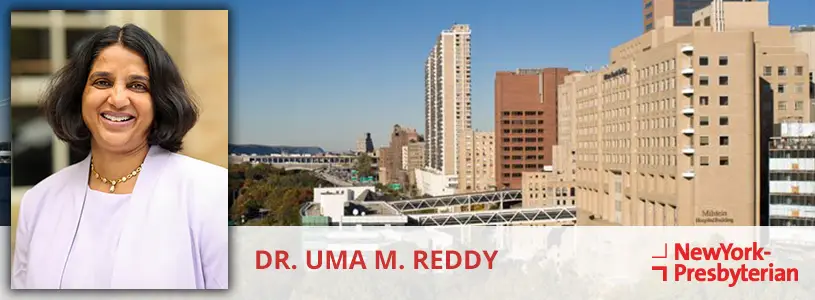Columbia and NewYork-Presbyterian's Dr. Uma Reddy Elected to National Academy of Medicine
Oct 21, 2024
New York, NY

Dr. Uma M. Reddy, professor and vice chair of research in the Department of Obstetrics & Gynecology at Columbia University Vagelos College of Physicians and Surgeons and professor of population & family health in the Mailman School of Public Health, is among a select group of leaders in medicine and health elected this year to the National Academy of Medicine.
Election to the National Academy of Medicine is considered one of the highest honors in the fields of medicine and health. This year’s class of 100 individuals has made major contributions to the advancement of medicine, health care, and public health and brings NAM’s total membership to approximately 2,400.
Reddy, who is also a maternal-fetal medicine specialist in the Department of Obstetrics and Gynecology at NewYork-Presbyterian/Columbia University Irving Medical Center, was selected for her leadership of paradigm-shifting research that has fundamentally advanced the understanding of stillbirth, neonatal morbidity and mortality, and labor management and its impact on maternal morbidity. Through large multicenter cohorts and trials, her research is driving new standards in national obstetric practice and improved outcomes for pregnant people and their children.
Before joining Columbia and NewYork-Presbyterian in 2022, Reddy served as professor of obstetrics, gynecology, & reproductive sciences and section chief of maternal-fetal medicine at the Yale School of Medicine.
From 2003 to 2018, as medical officer at the Eunice Kennedy Shriver National Institute of Child Health and Human Development, Reddy directed several large clinical trials and longitudinal cohort studies including the Maternal-Fetal Medicine Units Network. The MFMU Network, composed of 15 clinical centers including Columbia University Irving Medical Center, has conducted landmark studies that redefined clinical practice in obstetrics, including determining the optimal timing for induction of labor and establishing the benefit of corticosteroids for fetal lung maturity.
An international expert on stillbirth, Reddy directed the NICHD Stillbirth Collaborative Research Network, the largest U.S. study elucidating the epidemiology and causes of stillbirth. Through SCRN, Reddy showed how novel technology could enhance detection of genetic causes of stillbirth, resulting in microarray analysis being the standard of care in the workup of stillbirth. Reddy’s pivotal research challenged the conventional thinking that higher rates of medical and obstetric complications explained the entire Black-white disparity in stillbirth rates and showed that social determinants of health accounted for the increased stillbirth risk for Black individuals.
Reddy has had a profound impact on obstetric practice. She characterized how route of delivery for early preterm delivery directly impacts maternal morbidity, a transformative finding. As the senior investigator in the Consortium on Safe Labor, she redefined labor norms, prompting major changes in U.S. labor management guidelines. Reddy’s research refined the definition of “term” which, at the time, treated all infants born at 37 weeks or greater as a uniform group. She found that there were marked differences in the outcomes of infants born in the early part of this period compared to those born in the latter part. Based on these results, ACOG changed the definition of infants born at 37 and 38 weeks to “early term” births and infants born from 39 to 41 weeks to “full term.” Reddy’s research advanced our understanding of the causes of preterm birth and neonatal morbidity and mortality in the U.S. and the effects of gestational age, route of delivery and the race/ethnicity disparities on these outcomes. She has published more than 350 peer-reviewed papers, many in the most impactful journals including the New England Journal of Medicine and the Journal of the American Medical Association.
At Columbia and NewYork-Presbyterian, Reddy leads a study evaluating the effectiveness of a bundle of maternal sepsis safety for predicting the risk of maternal sepsis, the second leading cause of maternal death. She also leads NY-CHAMP, an NIH Maternal Health Research Center of Excellence with community partners to jointly identify how social determinants of health lead to disparities in maternal mortality and morbidity and policies to mitigate these effects. NY-CHAMP uses innovative strategies to reduce maternal mortality and morbidity in New York City and throughout New York state.
In addition to her research, Reddy is a respected educator and clinician. She has served on the American College of Obstetrics and Gynecology Committee on Practice Bulletins – Obstetrics and currently serves on the American College of Obstetrics and Gynecology Clinical Document Review Panel – Obstetrics Committee. She is a maternal-fetal medicine subspecialty board examiner for the American Board of Obstetrics & Gynecology and was selected in 2020 to participate in the Executive Leadership in Academic Medicine Program for Women. She is a fellow of the American Gynecological & Obstetrical Society.
Media Contact:
Office of Communications pr@nyp.org



